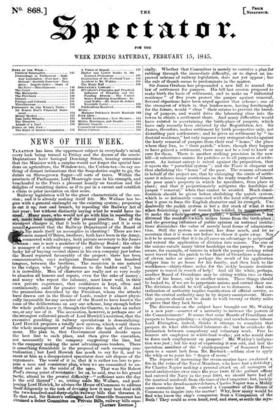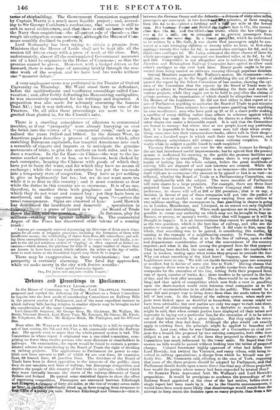NEWS OF THE WEEK.
TAXATION has been the uppermost subject in everybody's mind, every look being turned to Friday and the decree of the oracle. Deputations have besieged Downing Street, bearing entreaties that the Minister with a surplus would not forget the special bur- dens on agriculture, the Window-tax, the Cotton-tax—to say no- thing of distant intimations that the Soap-duties ought to go, the duties on Slave-grown Sugar—all sorts of taxes. Within the precincts of Parliament, Lord Monteagle rose in his strength, and vouchsafed to the Peers a pleasant homily on taxation and the delights of remitting duties, as if to put in a caveat and establish a claim to prior invention on that score. Railway legislation will be the great characteristic of the ses- sion; and it is already making itself felt. Mr. Wallace has be- gun with a general onslaught on the existing system; proposing to it it up,' root and branch, by repealing the Railway Act of last -ear ; but without distinctly saying what he would have in- , . Many more, who would not go with him repealing the act, made loud complaints of the present frictice. One of the Strongest charges is, that it leads to gambling; and it is even roundl rted that the Railway Department of the Board 6f as made itself an accomplice in cheating ! There are two Men named O'Brien, brothers; both have been in the Army, connected witlfrailways, both private secretary to Sir James am : one is now, a member of the Railway Board ; the other is manager of a railway company ; and the manager made the lucky hit of buying several shares in his own company just before the Board reported favourably of the project; there has been communication, says malignant Rumour with her hundred tongues, between the brothers. The suspicion is one natural to the vulgar, who " gladly deemen to the badder end"; but it is incredible. Men of character are really not so very ready to abandon all honour and repute, even for the sake of money ; and many who repeat the calumny, must know well, in their own private experience, that confidence is kept, often and continuously, amid far greater temptations to break it. And the precautions described by the President, whom the attacks have drawn out in the House of Lords, render it almost physi- cally impossible for any member of the Board to have known the issue of the deliberations on any one scheme, long enough before the whole public knew it, through the Gazette, to make an unfair use, or any use of it. The accusation, however, is perhaps one of the strongest collateral proofs of Lord Howick's assertion, that the excessive rambling in railway speculations is demoralizing. Lord llowick proposes a totally new system, which would throw the whole management of railways into he hands of Govern- ment. His plan is, that Government should decide upon the best line to each place, and then, give the execution, not necessarily to the company suggesting the line, but to the company making the 'most advantageous tenders. There is something formidable in the proposal'of such sweeping cen- tralization ; but Lord Howick has much to say for it, and to sneer at him as a disappointed speculator does not dispose of the argurbents. The worst of it is, that it is rather too late to pro- pose a neat and consistent plan, when we are committed to an- other and ale' in the midst of the mess. That was Sir Robert Peel's strong point of resistance : let us, he said, true to his grand tactic, attend to the present difficulty—" sufficient unto the day is the evil thereof" : so, Settin aside Mr. Wallace, and post- poning Lord inivich, he advises Setting aside
the House of Commons to address itself diligently to the task of devising how it may best deal with the two-hundred-and-forty-eight railway bills that threaten it. To that end Sir Robert's Lord Granville Somerset has
obtained a Committee on Private Bills, railway bills espe-
daily. Whether that Committee is merely to contrive a plan for rubbing through the immediate difficulty, or to digest an im- proved *scheme of railway legislation, does not yet appear ; but the rule of thumb seems to predominate in the matter.
Sir James Graham has propounded a new bill to amend the law of settlement for paupers. His bill last session proposed to make birth the basis of- settlement, and to make an " industrial residence " of five years protect the pauper against removal. Several objections have been urged against that scheme ; one of the strongest of which is, that landowners, having forethought for the future, would " clear " their estates to prevent the breed- ing of paupers, and would drive the labouring class into the towns to obtain a settlement there. And many difficulties would have existed in ascertaining the birth-place of paupers, which have only recently been obviated by the Registration Act. Sir James, therefore, makes settlement by birth prospective only, not disturbing past settlements ; and he gives no settlement by " in- dustrial residence," but only imposes very stringent checks against the hasty removal of paupers from their real " home," the place where they live, to " their parish," where, though they happen to have gained a settlement, there may not be a soul to know or care for them. There is another striking provision in the new bill—it substitutes unions for parishes as to all purposes of settle- ment. An instant outcry is raised against the proposition, that it upsets the " parochial system"; and the Times is eloquent on thus abolishing the " home " of the poor. The reasons advanced in behalf of the project are, that by enlarging the circle of settle- ment it relaxes many restrictions on the ready. transfer of labour, the poor man's property in which he speculates, from place to place ; and that it proportionately mitigates the hardships of pauper" removal," when that cannot be avoided. Much consi-r-- deration-should be given before abolishing the parish system, which is so-intimately connected with the local self-government that it goes to fertn the English character anclits strength. Un-, doubWly the parap system is: but a clry stock of what - it wai,. arben flourishing : are of transit has tended in is , s I to make the whole , .o...- ::.,:rationhat diforced-Ilie resid e .Vhic t makes home from the bifth-place.; and the growing i fiuence ofpublic opinion' On national institu- tions' diminishes the value of merely local forms of administra., tion. Still the system is ancient, has clone much, and let 41
mall cases an advantage to perpetuate is it to be assumed that it is irt
ascertain that it is worn out before we throw it quite away. Nor and extend the application of division into unions. The size of the unions entails many bitter hardships on the pauper. We are aware, for example, of unions in which the pauper seeking relief must travel from his parish to the Board of Guardians a distance of eleven miles or more : perhaps the result of his application obliges him to go home for his family, and then back to the workhouse—thirty-three miles for the sickly because destitute pauper to travel in search of help ! And all the while, perhaps, another Board of Guardians may be sitting within two or three miles of his home, only in another union. These things should be looked to, if we are to perpetuate unions and extend their use. The divisions should be well adjusted as to distances. And cen- tralization of authority implies ramification of official service, so that the central authority may be by deputy omnipresent. Miser- able paupers should not be made to walk twenty or thirty miles to prove that they lack bread.
The discussions on the subject have brought out Mr. Wakley
in a new part—asserter of a necessity to increase the powers of the Commissioners ! It seems that some Boards of Guardians set paupers to bone-grinding—a disgusting and unwholesome labour. Lord Ebrington, indeed, thinks it strange to complain that paupers do what able-bodied labourers do : but he-overlooks the distinction between compulsory and voluntary work. Free la-
bourers are employed in white-lead works; dare - yet who would da
to force such employment on paupers ? Mr. Wakley's indigna- tion was just ; . but his way of expressing it was -odd, and laid the quondam assailant of the " pinch-paupers " of Somerset House open to a 'smart lash from Mr. Roebuck—seldom slow to apply the Whip or to point his " finger of scorn."
The reports of increasing the steam-marine have awakened a fire in the veins of the Naval Members, who have had a field-day; Sir Charles Napier making a the attack on all managers of
naval architecture ever since the year 1800. If the gallant. officer had entered the Navy in the year 1000, we should have had all the nautical misdeeds from the time of the Conqueror; but, luckily for those who dread monster debates, Charles Napier was a Middy some centuries later. He wanted a Committee of the House Of Commons to inquire into the matter! Why; how many would he flied who know the sh 'Companion companion from 'Companion of the Bath ? They could as soon hand, reef, and steer, as settle the mys-:
Lades-of shipbuilding. The Government Commission suggested by Captain Harris is a much more feasible project ; and, accord- ing to Sir George Cockburn's confessions, that science is stilPto seek in naval architecture, and that-there is still nu Usliter-ruIe- the Navy than empiricism—the all-potent rule of thamb—a tho- rough investigation seems necessary, althonghthe Ifeuseof Com- mons sensibly declined to perforin it.
Lord Normanby has been trying to obtain a promise from Ministers that the House of Lords shall not be kept idle all the session till driven crazy with a press of work at the close. But, unfortunately, almost all the contemplated Government measures are of a kind to originate in the House of Commons ; so that the promise cannot be given. However, with a budget driven so far forward, there is some hope of spinning briskly through the rou- tine work of the session, and we have had tree weeks without one "monster debate."



























 Previous page
Previous page